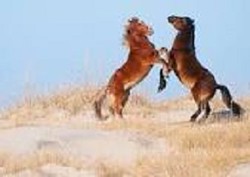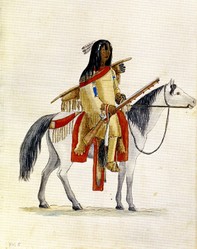Oh, what a sight to behold! Thanks to the National Park Service, the State of Carolina, as well as several other organizations, there are approximately 400 Banker horses (also known as Corolla wild horses) that still inhabit the Outer Banks, and their habitat is protected and they are also monitored for diseases and overpopulation.

Wild Horses of North Carolina's Outer Banks
by lindaburton2
Come with me and explore the history and exquisite beauty of the wild Banker Spanish Mustangs of the Outer Banks of North Carolina
History, Lifestyle and Protection
Banker Spanish Mustangs
The Outer Banks of North Carolina are basically a string of sand dunes stretching approximately 175 miles long that protect mainland North Carolina from the Atlantic Ocean. The Outer Banks of North Carolina was isolated for centuries, and in the 16th Century it is thought that the Banker Horse, also known as the Banker Spanish Mustang, is a feral horse descended from Spanish horses. It is thought to have been originally brought to the islands after surviving shipwrecks, or possibly being abandoned by Lucas Vazquesz d Ayllon or Sir Richard Greenville during one of their exploratory expeditions.
And oh, what a sight to behold! Thanks to the National Park Service, the State of North Carolina, as well as several other organizations, there are approximately 400 Banker horses (also known as Corolla wild horses) that still inhabit the Outer Banks, and their habitat is protected and they are also monitored for diseases and overpopulation.
Life for the Bankers is different than that of the typical domesticated horse, as they are surrounded by salt water due to the islands, and are dependent on pools of rainwater and moisture from the vegetation they consume for their water supply. They are also able to reach fresh groundwater by digging shallow holes of approximatly 2 to 4 feet. In spite of these perceived difficulties, they have survived for over 500 years and still exist in their natural state on Currituck County Outer Banks.
Today's Ocracoke and Corolla wild horses have the same distinguishing features of Spanish horses. One similarity is that they both share one less vertabrae than most breeds. Their size is quite small compared to other horses. They are generally approximately 14 hands (about the size of a pony), and have a docile temperment, endurance, and exquisite beauty that is only enhanced by their habitat along the sandy coastal islands. Their color is generally brown, although the shade may vary, and they have a distinctive thick sandy mane.
Today their are wild horse tours, where vacationers can take a guided tour in a 4 x 4 vehicle to view these beautiful creatures, although it is illegal to encroach within 50-feet of the horses. They generally congregate in small herds, and although they are generally mild mannered, one needs to keep in mind that they are wild feral creatures that live in a natural environment and are not used to interaction with people.
In a student initiated writing campaign from thousands of school children in three counties to state legislator Bill Owens, in January 2010, Governor Beverly Perdue wrote "North Carolina is proud to be home to the Corolla Wild Horse. They have graced our shores for generations, bringing visitors from across the state and beyond to North Carolina to witness this marvel. We are privileged to have these horses as part of our heritage and count on the Corolla wild horse as being part of the landscape for generations to come." In May of 2010, Governor Perdue desgnated the Colonial Spanish Mustang as the North Carolina State Horse.
You might also like
The Survival of Horses in Pre-Columbian AmericaMany people believe that the horse completely disappeared from North America,...



 Teach Your Horse to Neck Reinon 02/08/2017
Teach Your Horse to Neck Reinon 02/08/2017

Comments